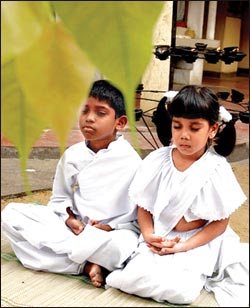Happiness here and now
Without a proper understanding of the Dhamma, the teaching of the
Buddha, many believe that Buddhism is otherworldly and concerned only
with life beyond the grave. This is totally incorrect. Numerous advice
is given in the Dhamma for mankind to lead a happy and contended life in
this world itself.
Both the Arahats, who have realized Nibbana, and ordinary Puttujjana
people have to face pleasant and unpleasant experiences in life. In
fact, life is a continuous process of experiencing pleasurable,
unpleasurable and neutral feelings. However, there is a difference
between the ordinary being and Arahats.
|

Meditation. File photo |
The ordinary beings on account of their greed for pleasurable
experiences are attached to them. On the other hand, because of aversion
they resent unpleasurable experiences. They are elated when successful
and depressed when there is failure. Not so the Arahats. Being free from
greed and aversion they are equally detached from both congeniality and
adversity.
This does not mean that we should accept every problem or difficult
situation we face. That would be fatalism. If there is a reasonable
prospect to change the situation for the better, we should attempt to do
so realizing that it could result in success or failure. Then we would
accept failure also with equanimity being prepared for it. However, when
we know that certain things cannot be changed we should accept it. For
instance, when it is raining on a day that we wish it would be bright,
we have no control over the weather and it is wise to accept rain, on
such occasions, as a part of Dukkha, the unsatisfactory nature of life.
A modern poet has described this position appropriately in the following
words:
“For every ailment under the sun,
There is a remedy or there is none;
If there be one, try to find it,
If there be none, never mind it.”
The world is full of unpleasant surprises and deep disappointments
that adversely affect even those who are affluent, powerful, comfortable
and respected in society. Things do not always happen the way we wish.
If all things cannot be changed as we want, we should change ourselves
and accept the inevitable with resignation and understanding. That would
make life more happy and contented.
Contentment is a source of great happiness and the Buddha commended
this great quality in the following words (Dhamma Pada - Verse 204).
Santhuthi Paraman Danam
Contentment is the highest wealth
When things are going well the mind is not disturbed or agitated. Yet
there is the danger of going overboard with supreme confidence,
arrogance and conceit. Retaining one’s mental poise when things are good
is much easier than when things go wrong. When control has been acquired
in times of success it becomes easier to exercise it in moments of
distress.
Living in the present and not in the past or the future is conducive
to happiness and contentment. The past is gone and nothing could be done
about it while the future is yet to come.
We live in the present moment and it is the present moment over which
we have some control. When the Buddha was asked by King Pasenidi of
Kosala why His monks look happy and cheerful while the clergy in other
religions look gloomy. He replied it is because His monks live in the
present and do not regret the past or brood over the future. In this
connection the words of the Persian poet Omar Khayyan are appropriate.
Unborn tomorrow,
Dead yesterday,
Why fret about it,
If today be sweet.
One should also be happy with what one is doing. Attending to a sick
patient may be not pleasant but it could be transformed to happiness
realizing that you are providing some relief to a sick man, a good
action indeed.
On the other hand, a sick person is one of the four Divine Messengers
that helped the Bodisatta to realize the unsatisfactory nature of life
and search for the truth to overcome suffering. The other Divine
Messengers are an old man, a dead body and a recluse. So attending to
the sick is also an opportunity to understand impermanence and the
unsatisfactory nature of life.
The advice in the Dhamma to lead a comparatively happy and contended
life is substantial. Its practice is a gradual process and should be
undertaken with dedication and determination. Thus, a change of attitude
to success and failure, the pleasurable and the unpleasurable would make
life much more satisfactory here and now.
RAJAH KURUPPU Colombo 6 |



